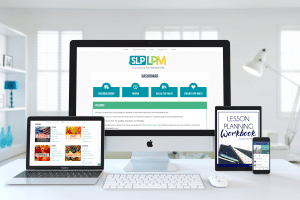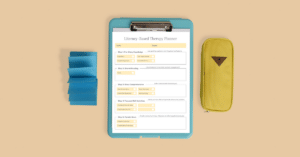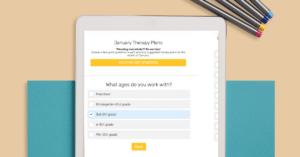Here are nine tools that help me worker smarter, not harder, as an SLP! I use these tools to help me work more efficiently when it comes to organizing materials, planning for therapy, managing progress monitoring, completing paperwork, and communicating with parents.
Caveat: If you’re not using any of these tools, then please don’t feel like you have to sign up for all of them! They won’t work for everyone, and it would probably be quite overwhelming (and counterproductive) to start using nine new tools all at once. Identify the areas that you struggle with most, and start using ONE new tool. Start where you are, and go from there. It makes it much more manageable that way.
So, let’s have a look!
1. Therapy Planning: Google Calendar
Google Calendar is my favorite! I set up recurring appointments for all of my therapy sessions, so I never forget to grab a student (which I’m embarrassed to admit would happen a lot without this tool)! I love the color-coding features.
Bonus hack? Share the event with your teachers for easy communication!
2. Therapy Activities: SLP Now Membership
Anyone else struggle to come up with fun, engaging activity ideas week after week? Even if we have amazing ideas, who has time to find and prep all those activities? That’s why I created the SLP Now Membership. It includes a database of therapy activities for easy planning. From the themed activities (e.g., book guides, crafts, and open-ended activities) to the skill packs (to help you teach and scaffold new skills), the majority of planning is taken care of. You just have to pick which resources you want to use on any given week.
3. Materials Organization: Evernote
Sarah from SLP Toolkit shares how she uses Evernote to inventory her materials. Genius! I use this to keep track of my books so I don’t buy 9348 duplicates. You could also use it to “scan in” therapy activities. I especially love the search feature for easy planning.
Evernote is also a great place to keep track of professional development notes for easy reference.
4. Materials Organization: Dropbox
I love using Dropbox to store parent handouts and other materials so they are easily accessible. This is a must for traveling SLPs!
5. Progress Monitoring: SLP Toolkit
This is a HUGE time-saver. This is my “go to” for present levels assessments, writing goals, and progress monitoring. SLP Toolkit makes it easy to gather evidence to back up my recommendations. It makes writing IEPs a breeze. The app even generates a profile of strengths and concerns that you can copy and paste into your report!
6. Paperwork: Text Expander
SLP Toolkit really cut down on my report time, because I no longer have to waste time second-guessing myself or digging through piles of old data sheets. They also have an awesome present levels summary that I use to shape my reports.
However, there is one more tool that I use to save even more time. I always used templates for the things we type in every. single. report, but it was almost more efficient to type it (rather than searching through my massive list of templates that I added to a Word document). Enter the text expander! I created “codes” for frequently uses phrases in reports, emails, and therapy notes. The app that I use automatically identifies when I’m writing things multiple times, so it helped me build my library. You can take a closer look here.
7. Paperwork (and To Do’s): Asana
I use Asana to keep track of all of my to do’s. I love that I can make lists and use their boards to keep track of processes (like IEPs and referrals). Stay tuned to learn more about how I use this.
8. Paperwork: Focus@Will
It may seem silly, but this music app really does help me focus! I put it on when I need to sit down and really focus on a project (like an IEP or progress reports). The music is actually pleasant to listen to, as well. I haven’t taken a good look at the research, but you can read more about it here. Another option is Brain.fm.
9. Homework/Parent Communication: Remind App
This has been a serious game changer for me when it comes to parent communication! I have a better relationship with my parents, and they are better equipped to help support speech/language skills at home. I send quick updates of what we did in therapy. I also use it to share homework ideas/activities. Stay tuned for more details!
Do you use any of these tools? Are there any that you want to try?







Leave a Reply